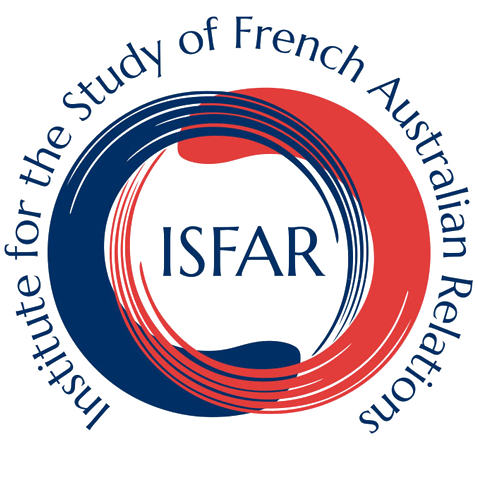Message from the President
It is hard to believe it is time for another ISFAR Newsletter already! As you can see, we have been very busy with several interesting and successful activities, which many of our members have participated in. We appreciate your involvement and ongoing support for all things ISFAR.
The first activity this quarter was our AGM, which was held on 20 March. The 2023 Committee was appointed as follows:
President: Kerry Mullan
Vice President: Véronique Duché
Treasurer: Richard Miller
Secretary: Pauline Georgelin
Co-editors FAR: Elaine Lewis and Jane Gilmour
Newsletter Editor: Robyn Stern
Ordinary Committee members: Stephen Alomes, Alexis Bergantz, Chantal Crozet, Briony Neilson, Graham Neilson.
The AGM was quickly followed by the 2023 ISFAR Symposium ‘New Perspectives in French-Australian Studies’ from 13 to 14 April where the inaugural Colin Nettelbeck Scholarship was awarded (see separate item and profile of the winner below), and the first Melbourne Salon in the new AFM Pop-Up space on Madame Brussels Lane (see also below). The next Melbourne Salon will be on 26 July when people have recovered from the Bastille Day French Festival and are ready for their next French fix. The topic will be ‘Foreign Language Bookshops: the inside story’, so save the date! Full details are available here.
Speaking of the BDFF, watch out for our annual ISFAR online quiz for your chance to win a Melbourne International Film Festival Discovery Pass (valid for six (6) standard festival sessions at MIFF 2023).
This issue of the newsletter also includes a profile of committee member Dr Chantal Crozet, news of an appearance by Research Committee co-chair, Alexis Bergantz, at the Sydney Writers Festival, and links to an array of French-related exhibitions, events, news articles and other items.
Bonne lecture!
The French Australian Review no. 74
As the Melbourne winter sets in well and truly we are working on issue 74 of The French Australian Review, which will be published in August.
It will include an article by Elizabeth Rechniewski, co-chair of the ISFAR Research Committee, on Louise Michel, who was deported to Noumea in the 1870s for her role in the Paris Commune. During her seven years in New Caledonia, she came to know the Kanak people very well and wrote about them, their culture and their land, as well as recording their stories. She wrote about the role of the deportees in setting up the first theatres in Noumea and the islands—interestingly, some of the plays were written by deportees and Rechniewski’s article focuses on a play, probably written by Michel in New Caledonia but not published until after her death in 1905. In the play, Civilisation : [Scènes de la vie des primitifs au 20e siècle], Michel addresses directly and satirically the nature of the ‘civilisation’ that the Europeans have brought to the Pacific.
A second article, by Paul Kiem, looks at two French families, the Huybers and Loureiros, and their social and cultural influences on Australia, especially in the decades around Federation.
Eric Berti who was Consul-Général of France in Sydney from 2012 to 2015, has written an opinion piece in response to Ivan Barko’s article included in the last issue of The French Australian Review, ‘Australia’s Love-Hate Relationship in the Last Two Centuries’. Berti, who has returned to Paris, where he is currently the internal mediator of the French Ministry of Foreign Affairs and an Officier de la réserve citoyenne de la Marine française, presents a French point of view on the vagaries of French-Australian relations.
For some time the editors have wanted to publish something by Barbara Glowczeski, one of the most respected French anthropologists, researching Australia’s First Nations peoples since the mid-seventies. We have received her permission to publish a paper she presented initially to an international conference held at the Musée du Quai Branly in 2013. In this paper she presents the reasons she has always chosen, in her work, to respond to Aboriginal priorities rather than to the traditions of academic discourse. The paper, titled ‘From Academic Heritage to Aboriginal Priorities: Anthropological Responsibilities’, surveys her work over thirty-four years and she writes that ‘anthropological responsibility in terms of theory—for me—is to advocate “dissensus” as defined by Guattari’ in place of the ‘consensus of assimilation’.
In 2015–16, The French Australian Review published an article by Maryline Brun tracing the history and geography of Australian Studies in France. Deirdre Gilfedder, who is an Australian-born academic working at the University of Paris-Dauphine has, with the assistance of Matthew Graves, Maryline Brun and Salhia Messael, updated that earlier study and, through her analysis of the difference between the French and Australian university systems, has pointed out the diverse streams of study—literature, anthropology, ‘civilisation’ and other disciplines such as architecture—in which Australian Studies are found in French universities. She notes that since 2015 there has been a growing interest in post-colonial studies leading to an interest in ‘Commonwealth’ studies. In the last two decades, the Geohumanities seminar which brings together Commonwealth studies specialists from seven universities in the south of France has provided an itinerant venue for research in Australian Studies. This is an important document, which provides a point-in-time snapshot of the state of Australian studies in France.
The French-Australian Encounter (number 9) will be an interview with Mireille Vignol, who lived in Australia for eighteen years, working as a journalist for SBS and the ABC. Since her return to France in 2002, she has translated over sixty works by Australian writers as well as books by writers from Oceania, North America, South Africa and England. More recently she has been organising ‘Translation Slams’ (or ‘joutes’ as they are called in France).
Book reviews and the usual Bibliographical Notes will complete the issue.
Copies of the The French Australian Review and/or of individual articles are available for purchase. Please go to: https://www.isfar.org.au/journal/
Biennial ISFAR Symposium: New Perspectives in French-Australian Studies
The 2023 ISFAR Symposium, ‘New Perspectives in French-Australian Studies’, was held 13–14 April, on zoom. With ten papers and two keynotes, the Symposium was generally held to be a considerable success, with praise for the variety of topics covered and the discussion generated by such well-considered and interesting presentations. We were particularly pleased that three colleagues from France were able to take part, including the winner of the inaugural Colin Nettelbeck Scholarship, Alice Duncan. Alice, currently a PhD student in Fine Art at RMIT, was awarded the Scholarship for her fine paper: ‘Exploring Cross-Cultural Representations: French Children’s Literature and Australian Indigenous Culture’.
The two keynote speakers both took innovative approaches to their subjects: Matthew Graves on unofficial diplomacy, through his presentation of the Fleurieu mission to Australia in the early twentieth century; and Nic Maclellan on the ‘silenced voices’ of local Pacific leaders on major power politics in the region.
The audience ranged from 24 to 38 for the papers and keynotes.
FAR 75, to appear in summer 2023–24, will be a Special Issue devoted to articles drawn from papers given at the Symposium. We already have commitments for at least six articles for this issue.
Profile: Alice Duncan
Exploring Cross-Cultural Representations: French Children’s Literature and Australian Indigenous Culture
I am an artist, researcher, and PhD candidate at RMIT University’s School of Art in Melbourne. My practice-based research revolves around engaging with diverse communities in the Northern Territory. More specifically, I organise and facilitate photographic workshops tailored for young people within Indigenous communities. The primary objective of this research is to actively challenge and deconstruct the dominant narratives often found in photography, with the aim of fostering a transformative process of decolonisation in visual communication.
In 2022, I was the recipient of a Nicolas Baudin scholarship and undertook a six-month research project at the Université Sorbonne Paris Nord under the guidance of Associate Professor Vanessa Castejon. During this time, I undertook research into representations of Indigenous people and culture in French children’s literature.
This study analyses the impact of French children’s literature on the representation of Indigenous Australians and how it perpetuates harmful stereotypes. It considered the role of children’s literature in shaping the worldviews of future generations and how literature constructs young readers as colonial subjects, reinforcing social inequalities that exist due to colonialism. By examining French children’s books, this research explores how these narratives construct Indigenous culture as “other” and contribute to the ongoing effects of colonialism.
The study also considers the historical context of colonialism and its ongoing effects on Indigenous cultures, highlighting the contradiction between the perpetuation of colonial attitudes and France’s value of equality. By shedding light on the transmission of colonial ideologies through literature, this research seeks to understand how these attitudes and beliefs are communicated and reinforced through children’s literature, impacting future generations’ world views.
The findings of this research have important implications for promoting cultural understanding and equality between France and Australia, and for understanding how society perpetuates social inequalities. The research was conducted using the extensive collections of French children’s books at the Bibliothèque nationale de France (BnF) and the Sorbonne Paris Nord University library. This research has been generously supported by the Embassy of France in Australia, BnF, the Ian Potter Cultural Trust, ISFAR, RMIT University and the Université Sorbonne Paris Nord.
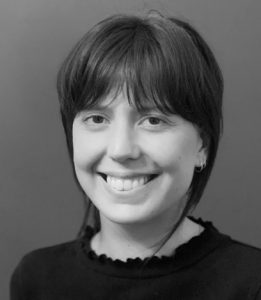
Credit: Alice Duncan
Profile: Chantal Crozet—Ordinary ISFAR Committee Member
I was born and raised in France where I completed my primary and secondary schooling. I spent seven years in a French lycée in Lyon between 1968 and 1974. These were years of fascinating but intense and disruptive political, social and cultural upheavals. Put off by the on-going strikes and protests on French university campuses during that period, and like many young people of my generation, I postponed studying at university and instead travelled the world extensively for several years.
My tertiary education started in Spain and continued in Australia where I had migrated in my early twenties. I completed a BA in French and Spanish literature at the University of New England and the University of Canberra combined, followed by a Diploma of Education allowing me to teach languages. However, soon dissatisfied with what I perceived to be a lack of serious commitment to teaching and learning languages in compulsory primary and secondary schooling, I ended up studying graduate law at the Australian National University (ANU) whilst tutoring in the French department at the same university.
My love for teaching my native language and culture soon grew and overtook my interest in law. I also developed a keen interest in Linguistics (and also Sanskrit) which led me to the completion of a Master’s degree by research followed by a PhD in Linguistics, both at the ANU. Since then, my general research interest has focused on the links between language and culture, in French, Australian-English and more generally across all languages. I held a lectureship in French studies at the ANU for a few decades before moving to RMIT University in Melbourne in 2014 where I have been lecturing in French studies and Intercultural Communication since then.
I was always aware of the existence of ISFAR from the start of my academic career. However, I kept a curious but distant interest in its development over the years not knowing if/how I could fit in the institute. It is only when I met and worked with ISFAR’s current president (As/Prof Kerry Mullan) that I started to see possible contributions to the organisation for someone with my kind of background and interests. As I am nearing retirement from my full-time academic position at RMIT, I look forward to being more proactive in contributing to ISFAR in new and creative ways which bring language and culture issues to the fore, in the context of French-Australian relations.
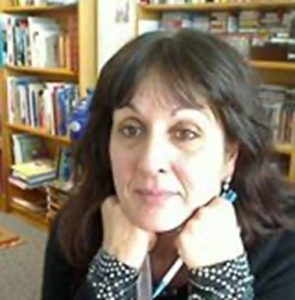
Credit: Chantal Crozet
Jean-Marc Regnault on Recent Developments in French Polynesia, Friday 21 July, 10am AEST, organised by the Institute for the Study of French-Australian Relations (ISFAR)
Did you know that the recently elected President of French Polynesia, Moetai Brotherson, is a longstanding advocate of independence for French Polynesia? Or that the three deputies elected to the French parliament are also supporters of independence? Possibly not, since here in Australia we hear so little about what is happening there. We are delighted therefore to announce that Jean-Marc Regnault, maître de conférences émérite and researcher at the Université de la Polynésie française, will discuss recent developments in the territory in a seminar to be held on Friday 21 July at 10am AEST (Sydney, Canberra, Melbourne time).
The presentation will be in French and on zoom, with the provisional title:
‘Les indépendantistes, minoritaires en voix mais majoritaires à l’Assemblée de la Polynésie ou des résultats inattendus en démocratie’.
Jean-Marc Regnault is the author of numerous books and articles on French Polynesia including Pouvana’a et de Gaulle: La candeur et la grandeur (2016); Le nucléaire en Océanie, tu connais ?: Les essais atmosphériques, 1946–1974 (2021) ; Gaston Flosse: Un Chirac des tropiques ? (2020) and many more.
In a recent long essay he reflects on the geopolitical changes that must be taken into account in any assessment of the future of the French territories in the region: Ne vous laissez pas submerger par le monde qui vient : Changements de paradigmes en Asie-Pacifique, October 31, 2022.
Registration is free. Event link: https://www.eventbrite.com.au/e/jean-marc-regnault-recent-developments-in-french-polynesia-tickets-660882576577
The Melbourne Salon
The first Melbourne Salon for 2023—and the first in the new Pop-Up premises of the Alliance Française de Melbourne—was held on 23 April.
The topic was ‘France and Australia cultural differences’. Based on her personal experience and her 20-year career as an international business manager, Sabrina Teller presented an overview of Cultural Intelligence and how this can help us understand the cultural differences between France and Australia. Sabrina also discussed key cultural dimensions where French and Australians have different ways of working which can impact on performance when working together, and advised how we might go about navigating culture shock and dealing with unfamiliar communication styles.
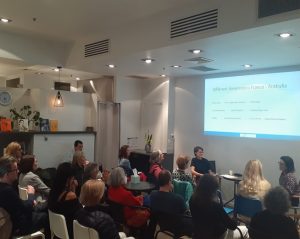
Credit: Kerry Mullan in conversation with Sabrina Teller

As a cross-cultural consultant and trainer, Sabrina Teller is dedicated to helping executive expatriates adapt to their new working environment as well as helping multicultural teams to work successfully together, through cultural consulting and awareness programs.
If you missed this Salon but would like to contact Sabrina for further information or advice, please see her website: https://www.sabrinateller.com/
The next Melbourne Salon will be held on 26 July on ‘Foreign Language Bookshops: the inside story’. Full details and links to registration are available here.
AFRAN News
A new community is born within AFRAN for Humanities and Social Sciences and its transdisciplinary links! ISFAR is delighted to have been invited to be part of this initiative, along with the Australian Society for French Studies and the Congress of French Laureates of Australia. We look forward to being part of this new community and seeing it unfold.
Created with the aim of enhancing academic and cultural links between Australia and France, this community gathers outstanding actors dedicated to the promotion and sharing of Australian and French language, culture, education and research in the field of humanities and the social sciences. This community offers many opportunities to contribute to a better understanding of Australian and French scientific communities, and improved impact of our two countries’ influence on the international stage.
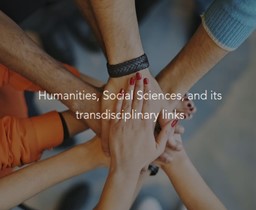
For more information: https://www.afran.org.au/humanitiesandsocialsciences
Alexis Bergantz at the Sydney Writers’ Festival
The Research Committee co-chair, Alexis Bergantz, author of French Connection: Australia’s Cosmopolitan Ambitions, winner of the Australian History Prize, was a guest speaker on the panel ‘Connections, Culture and Community: In Conversation with the Winners of the NSW Premier’s History Awards 2022′ at the Sydney Writers’ Festival on Tuesday 23 May. An enthusiastic audience brought to the topic of Australia’s obsession with ‘Frenchness’ their own experiences and responses to the themes of the book, while Alexis also reflected on its contemporary relevance to understanding the recent fractured relations between France and Australia.
The following photograph shows the panel of speakers in the Gallery Room at the State Library of NSW: Mina Roces (l), winner of the General History Prize for The Filipino Migration Experience: Global Agents of Change; Alexis Bergantz; and Katherine Biber and Leroy Parsons, winners of the Digital History Prize for The Last Outlaws. The panel was chaired by Emeritus Professor Grace Karskens.
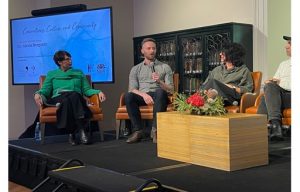
Credit: Laura Sayle, History Council of NSW
Bastille Day French Festival volunteers

Are you interested in being part of a vibrant community and helping to bring an exciting event to life? The Bastille Day French Festival is looking for someone like YOU!
Registration is now open to become a volunteer at this year’s Festival, to be held on Saturday 8 and Sunday 9 July, at the iconic Queen Victoria Market’s Shed’s C & D.
There are plenty of roles, including Set up and Pack up, Information Guides, Ticketed Program Assistance, Le Bar staff and more, with shifts available on both days of the event, as well as the Friday night.
Follow the link to register your interest in being part of our 2023 Bastille Day family. Full training will be provided prior to the event. Become a volunteer
Don’t miss the annual ISFAR online quiz for your chance to win a Melbourne International Film Festival Discovery Pass (valid for six (6) standard festival sessions at MIFF 2023).
Links to current and upcoming events and exhibitions
Visit the 2023 Melbourne Winter Masterpieces exhibition ‘Pierre Bonnard: Designed by India Mahdavi’ at the National Gallery of Victoria, from 9 June to 8 October 2023. The exhibition features more than 100 works by Bonnard, presented within a contemporary scenography by award-winning architect and designer India Mahdavi.
Also not to be missed is the exhibition ‘Chagall’ presented by the Jewish Museum of Australia: Gandel Centre of Judaica, from 9 June to 10 December 2023.
For more French related events, see https://sacreblue.org/ (Facebook https://www.facebook.com/sacrebluewaves/)
Items of interest
ISFAR Research Committee co-chair Alexis Bergantz was interviewed for an episode of the SBS podcast series Community Starters: Finding the people who laid the foundations of multicultural Australia where he provided commentary on the French presence in Australia.
A newly discovered 330-year-old French diary records the landmark sighting of Australia in 1687: https://www.smh.com.au/world/europe/newly-discovered-diary-records-landmark-sighting-of-australia-in-1687-20230326-p5cvbe.html
On 7 May ABC Radio Nightlife broadcast an interview with Peter McPhee (University of Melbourne) on ‘The week the world first saw the Eiffel Tower’: https://www.abc.net.au/radio/programs/nightlife/eiffel-tower/102315246
Matilda Marseillaise reports on the performance of Paris Combo at the Adelaide Festival in June: https://matildamarseillaise.com/paris-combo-adelaide-cabaret-festival-en/?fbclid=IwAR1VKCxhk-LZm22c-y0ZDHSMAmpnlLmlyEXdqu-ncerLrwECelST6Hvlrs4
On 19 June the Asia-Pacific Development, Diplomacy & Defence Dialogue (AP4D) held a symposium to launch the new paper ‘Enhancing Australia-France Coordination in the Indo-Pacific’. The recording of the webinar is available here: https://www.youtube.com/watch?v=wzkcL9u2O. The paper is available here.
Listen to the SBS podcast ‘Rencontre avec Jillian Symons, Managing Director de Intext book company / Language International Bookshop pour parler du catalogue et le projet de livres francophones des librairies francophones d’asie pacifique avec l’Alliance Française de Melbourne et l’Alliance Française de Sydney’. The podcast is available at: https://www.sbs.com.au/language/french/fr/podcast-episode/le-projet-de-selection-de-livres-francophones-des-librairies-francophones-dasie-pacifique/a54un4yik?fbclid=IwAR3dQTkaaEkjXuEJA2EqGPRAGAp2By4Z896Tl0-Ks_uKaMbUjM-w6NMSGMs
The catalogue is available at: https://cloud.3dissue.com/79/134/255413/AILFCatalogue22/index.html?r=12?r=12
Justin Wastnage in The Conversation reports on current political developments in New Caledonia: https://theconversation.com/with-independence-off-the-table-for-now-whats-next-for-new-caledonias-push-for-self-determination-204536
Another article in The Conversation describes the composition and functioning of New Caledonia’s First Nations consultative body, the Customary Senate, established under the Noumea Accord: https://theconversation.com/new-caledonia-has-had-an-indigenous-body-advise-government-since-1999-what-can-australia-learn-204906
In 1994 Jean Dulon and his girlfriend travelled around Australia in his iconic red Twingo. During his travels he asked Indigenous artists to paint on the car. In 2016 he donated the car to the National Museum of Australia, returning to Australia this year to see it again at the museum. https://au.ambafrance.org/From-a-1994-road-trip-to-now-A-Frenchman-s-love-story-with-Australia
Champion de France de football australien 2023
After Australian Football returned to France in the last years of the 20th century a national league has evolved, playing 9-a-side men’s and women’s matches. Now it has a Northern Division and a Southern Division. It is part of the international expansion of the Australian game across all continents, although this is often unknown to many footy followers and AFL club supporters.
Le foot Australien—the French competition
Most players are French (some having travelled to Australia, others discovering the game through screens and contacts), except in Paris where there are several Australians.
The French men’s team, Les Coqs, defeated Australian Spirit at this year’s Anzac Cup at Villers Bretonneux on the weekend before Anzac Day, with the results reversed in the women’s match.
France has participated in recent AFL International Cups in Australia and in the most recent Europe Cup in Croatia in 2022 and is preparing for Kiel, Germany in July 2023.
Grand Final 2023
The culmination of the French League is the Grand Final, this year hosted by Bayonne on Saturday 3 June 2023. In the men’s final a tight match ensued. The final score: Paris Cockatoos 121 defeated Gabians de Palavas 97. Earlier, at 3/4 Time, the Gabians de Palavas were leading 88–73.
The victors will represent France in the European Champions League in 2024.
The Gabians de Palavas, the successor to the Montpellier Firesharks, was only formed in 2022 and seven players began playing footy this year.
In the women’s final, in a one-sided encounter, the South West Suns convincingly defeated the Northern Griffins.
For the first time the best player award, the Allan La Fontaine Medal, named after the star Melbourne FC player of the 1940s, was presented. The Man of the Match was Noé Laureillard, while Clotilde Decaux won the Woman of the Match trophy.
(With thanks to Stephen Alomes, who wrote Australian Football The People’s Game 1958—2058, Walla Walla Press, Sydney, 2012, 2017.)
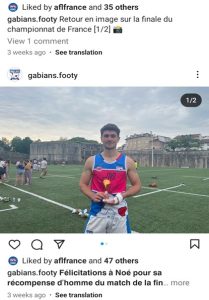
Image: Allan La Fontaine Medal winner Noé Laureillard
Source: Gabians de Palavas Instagram
